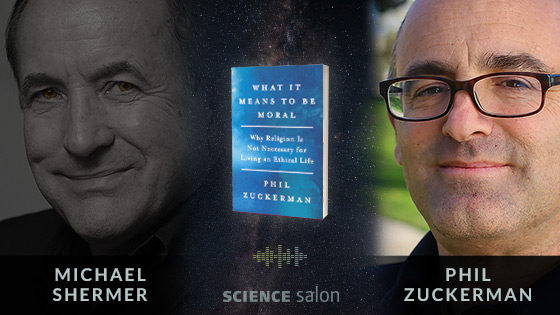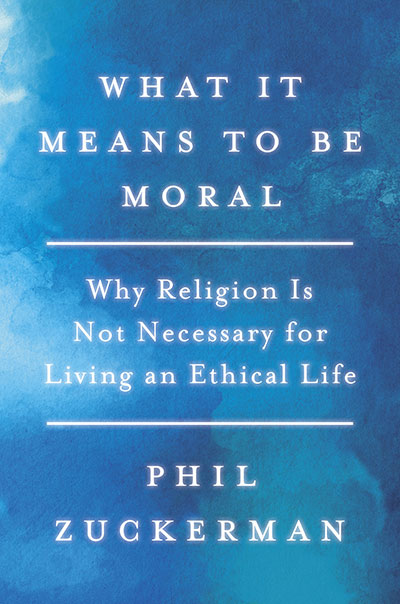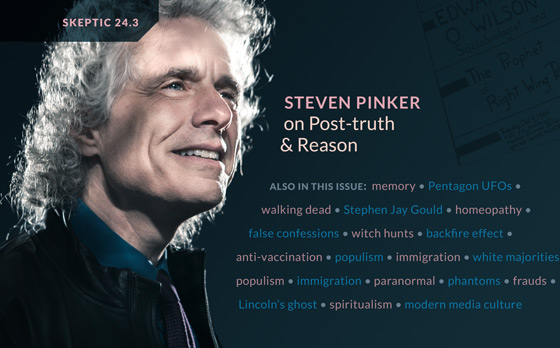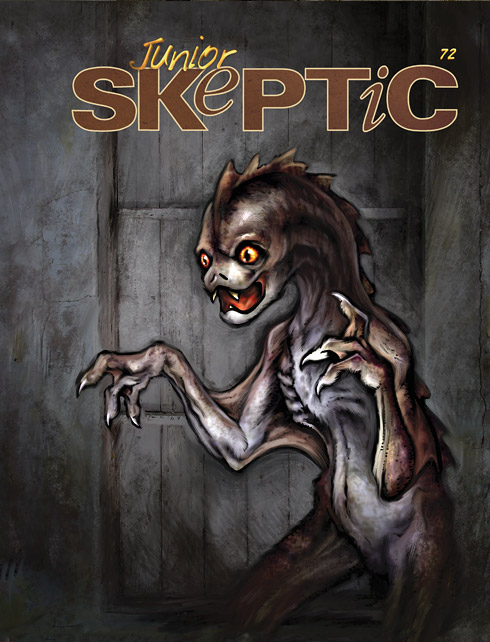SCIENCE SALON # 82
Michael Shermer with Phil Zuckerman — What it Means to be Moral: Why Religion is Not Necessary for Living an Ethical Life
In What It Means to Be Moral: Why Religion Is Not Necessary for Living an Ethical Life, Phil Zuckerman argues that morality does not come from God. Rather, it comes from us: our brains, our evolutionary past, our ongoing cultural development, our social experiences, and our ability to reason, reflect, and be sensitive to the suffering of others. By deconstructing religious arguments for God-based morality and guiding readers through the premises and promises of secular morality, Zuckerman argues that the major challenges facing the world today―from global warming and growing inequality to religious support for unethical political policies to gun violence and terrorism―are best approached from a nonreligious ethical framework. In short, we need to look to our fellow humans and within ourselves for moral progress and ethical action. Shermer and Zuckerman discus:
- what is morality and what does it mean to be good?
- the evolutionary origins of morality
- the “naturalistic fallacy,” or the “is-ought fallacy” and why it need not always apply
- how we’ve made moral progress over the centuries thanks to secular forces
- why religion is always behind the wave of moral progress (but takes credit for it later)
- the origin of good and evil
- how to solve crime, homelessness, and other social problems through science, reason, and secular forces, and
- the seven secular virtues.
Dr. Phil Zuckerman is the author of several books, including The Nonreligious, Living the Secular Life, Society without God, and his latest book, What it Means to be Moral. He is a professor of sociology at Pitzer College and the founding chair of the nation’s first secular studies program. He lives in Claremont, California, with his wife and three children.
Listen to the podcast via Apple Podcasts, Spotify, Google Podcasts, Stitcher, iHeartRadio, and TuneIn.
Check Us Out On YouTube.
Science Salons • Michael Shermer
Skeptic Presents • All Videos
You play a vital part in our commitment to promote science and reason. If you enjoy the Science Salon Podcast, please show your support by making a donation.
SKEPTIC 24.3
Order the print edition, or download the digital edition today!
In the latest issue of Skeptic Magazine (24.3), Steven Pinker provides an (unnecessary) defense of reason and a (necessary) defense of universities’ role in advancing it. Also in this issue: The SkepDoc: Coconut Oil: Health Food or Health Hazard? by Harriet Hall, M.D. • The Gadfly: The Persistence of Memory… and of the Memory Wars, by Carol Tavris • The “Lost” Tribes of Israel • The Pentagon’s UFOs How a Multimedia Entertainment Company Created a UFO News Story • The Problem with the Walking Dead And How They Flummoxed Science for Centuries • The Enigma of Stephen Jay Gould • Why the Human Brain Did Not Evolve to Accurately Represent the True Nature of Reality • Homeopathy’s New Clothes: Release Active Drugs • Pressured Apologies, False Confessions, and Witch Hunts • Two Kinds of Progressive Atheism • Surfing for Truth in All the Right Places: An Empirical Test of the Backfire Effect and How the Internet Can Reduce Anti-vaccination Attitudes • Reviews of Whiteshift: Populism, Immigration, and the Future of White Majorities • Spectacle of Illusion: Deception Magic and the Paranormal • The Apparitionists: A Tale of Phantoms, Fraud, Photography and the Man Who Captured Lincoln’s Ghost • Supernatural Entertainments: Victorian Spiritualism and the Rise of Modern Media Culture • Junior Skeptic 72: The Chilling, Changeling Chupacabra!
DIGITAL EDITION
On what devices can I read it?
Read the digital edition of Skeptic magazine on your Apple iPads and iPhones, Android tablets and phones, Amazon Kindle, Windows Surface and phones, or on your PC or Mac via PocketMags.com. Your magazine purchase(s) can easily be synchronized across multiple devices. Find out how to read Skeptic magazine on your favorite device(s).
30-DAY FREE TRIAL : We offer a 30-day free trial to new digital subscribers on annual subscriptions within the Skeptic Magazine App for iOS and Android devices.
JUNIOR SKEPTIC # 72
The Chilling, Changeling Chupacabra!
In this issue of Junior Skeptic we’ll investigate a mystery as gruesome as it is creepy. Hair-raising stories claim that a vampire beast stalks the shadows — stealthy, silent, and thirsty for blood. According to these tales, the chupacabra — or “goatsucker” — is rarely seen. It strikes farms in the night, feasting on blood from goats, sheep, chickens, and other helpless prey. These stories first terrified people in Puerto Rico, then spread to many other places. Some claim it is an unknown animal. Others say it is an alien predator or secret experiment gone wrong. What is the truth behind this modern vampire legend? Let’s find out!
Junior Skeptic — an engagingly illustrated science and critical thinking publication for younger readers (and the young at heart) — is physically bound within each and every issue of Skeptic magazine. About 30 Junior Skeptic back issues are also available as single downloadable PDFs at an amazing price!













